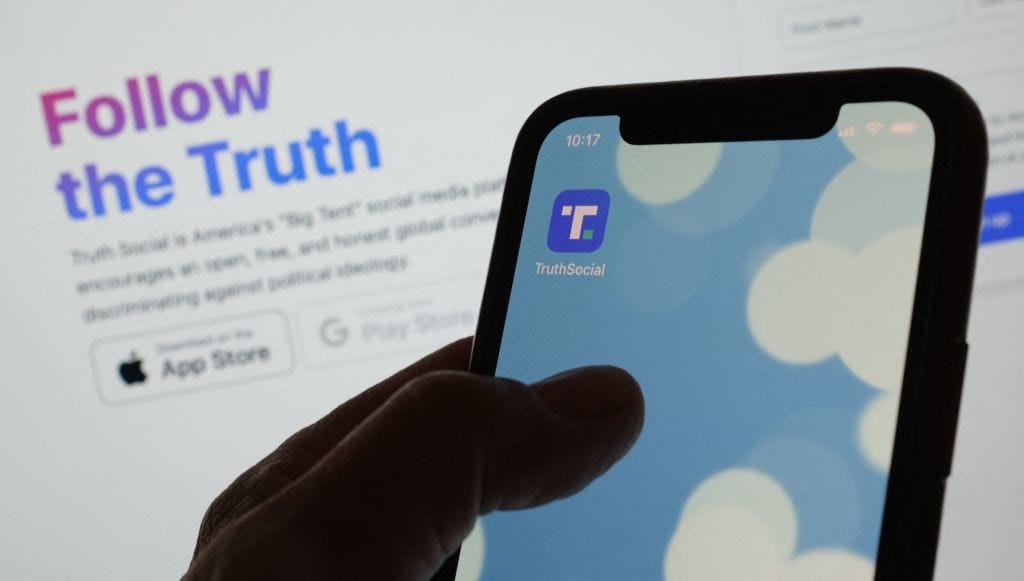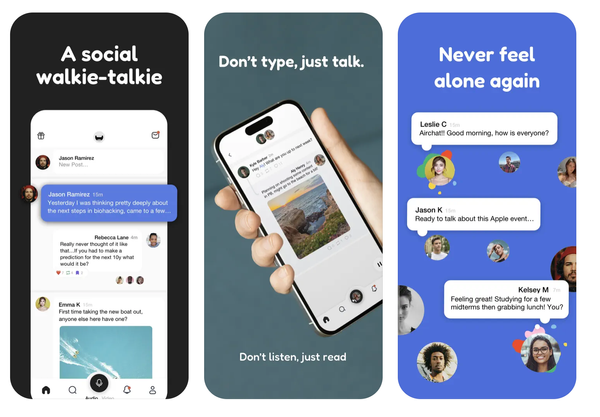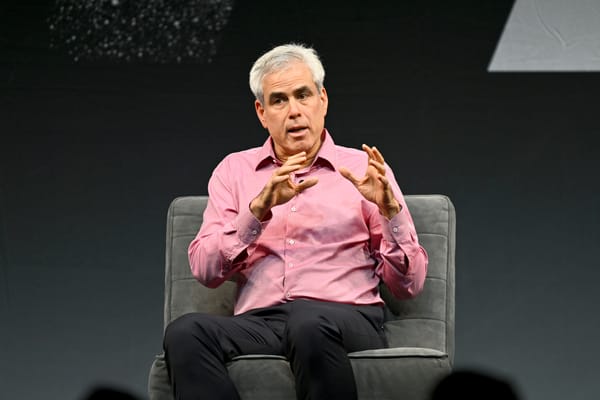The hard truth about Truth Social
Conservative alternative social networks keep making the same mistakes

I.
Today, let’s talk about some of the less obvious ways that conservative social networks keep slipping up — and whether Truth Social, which has the backing of President Trump, can manage to avoid their fate.
First, the news: Truth Social is live in the App Store, and hit No. 1 this week on the most-downloaded chart for iOS. Here are Bryan Pietsch and Jeff Stein in the Washington Post:
The app says it is “America’s ‘Big Tent’ social media platform that encourages an open, free, and honest global conversation without discriminating against political ideology.” It was released in the App Store over the weekend and was updated late Sunday for “bug fixes.” (Truth Social’s website says it will be in the Google Play Store soon.) […]
Users signing up to Truth Social are greeted by a sign-up email that describes the platform’s clientele as “Truth Sayers." “Share your unique opinion by posting a Truth, Re-Truth, photo, news story, or video link … Don’t be shocked if they take your Truth viral!" a welcome message states.
Truth Social also boasts one thing its rivals cannot: what seems to be at least one authentic post from Trump himself. That helped to sparked a wave of signups yesterday that signals at least momentary curiosity into what Trump’s presence could mean for a social app in 2022.
In the immediate term, Truth Social isn’t much of a threat its rivals, because almost no one has been allowed to use the site. (I signed up after it had been live for a few hours, and am currently #192,640 on the waiting list.) CEO Devin Nunes told Fox News he intends for the site to be fully operational by the end of March. But if it’s delayed beyond that point, it would not be a first for its parent company.
What else is there to say about Truth Social? It’s based on technology from Mastodon, the open-source social network. Its parent company, Trump Technology & Media Group, hopes to go public this year through a lucrative SPAC. Its terms of service document, like its user interface, appear to be largely copied and pasted from elsewhere. It prohibits “false, inaccurate, or misleading content,” a policy whose successful enforcement would represent a first in the history of the internet.
Maybe regular posts from Trump will be enough to create a durable social network. Perhaps his return to constant assaults on his enemies, and attacks on democracy, will create something lasting.
But another view is that we have already seen Trump-like networks rise and stagnate twice before. Trump was never on them, but many of his key allies are, and after splashy launches, both saw their growth slow significantly. The reasons, I suspect, are similar. And Truth Social may soon find itself stuck in a similar same ditch.
II.
On Wednesday I found myself in conversation with the CEOs of Truth Social’s immediate precursors: George Farmer, who took over Parler last May and has sought to revive the company’s fortunes after its app was deplatformed following the Jan. 6 attack on the Capitol; and Jason Miller, former chief spokesman for the 2016 Trump campaign, who now runs the app GETTR.
The occasion was Pivot MIA, the inaugural conference for Kara Swisher and Scott Galloway’s podcast. And the core question was whether apps like these — run by Republicans, fixated on narrow ideas about “free speech,” pitched to people who feel alienated by more mainstream social networks — have a real future.
That’s a separate question, of course, from whether I personally find these apps to be good or compelling. Run by Republicans, fixated on a narrow set of ideas, and pitched to people who feel alienated from the mainstream — that’s not a bad way to describe Fox News, which has been an economic miracle. If you believe, as I do, that Fox News has been a malign force in American politics, I think you want to stay attuned to the rise of its potential successors.
When I sat down with Farmer and Miller, then, I hoped to get a sense of whether they see something I don’t in what often appear, on their surface, to be extremely basic Twitter clones. And they are not clones only in their design — browsing them again today, I was struck by how many posts from top influencers on Parler and GETTR are simply tweets that have been copied and pasted over.
I also wanted to know what they expected to happen when a new alternative network endorsed by Trump himself appeared. Parler and especially GETTR had been built in anticipation that the former president would take refuge there after being suspended from Twitter, Facebook, and YouTube in 2020; didn’t it sting, I asked the CEOs, that Trump had opted not to join them?
Farmer told me that Parler is evolving into a less traditional social network, and would soon launch an NFT marketplace, and you can probably imagine the expression I have on my face as I type that sentence right now. “I don’t think Truth Social is really going to be competing in that space,” Farmer said of Parler’s NFT plans. We’ll see!
Miller, who worked closely with Trump and planned to meet him later the day we spoke, told me he was still optimistic about the prospect of a presidential GETTR account. “I’m going to see the president this afternoon and make the pitch again, to say @realdonaldtrump, all reserved and ready for you,” Miller said Wednesday.
He added that the announcement of Truth Social had led to a surge in signups for GETTR, and attributed the phenomenon to growing disdain for deplatforming among the mainstream networks. “I always say, to kind of channel my inner George Bailey, that every time Twitter or Facebook kick someone off of their platform, another GETTR angel gets its wings,” he said.
Perhaps it says something about the still relatively rare practice of deplatforming, then, that Parler and GETTR have relatively few angels in their ranks. Parler, which came as close as any of these apps have been to achieving breakout success, has had 11.3 million installations to date, according to Sensor Tower. GETTR, which launched last June, has 6.7 million. Daily users are presumably a small fraction of those numbers; lots of people took an early look but quickly churned, myself included.
So why didn’t they stay? Apps like these suffer a handful of core problems.
One, they are marketed as social networks, but they operate like broadcast networks. Join either Parler or GETTR and you’re asked to follow a bunch of conservative commentators and publishers, who immediately dominate your timeline with the exact same stories you can find on Breitbart or any other Republican-leaning publication. There are few, if any, surfaces for average users to get positive attention on these apps.
Moreover, as part of their efforts to distinguish themselves from Silicon Valley rivals — and to save money on hiring machine-learning engineers — Parler and GETTR have so far chosen not to create feeds ranked by engagement. That makes it even harder for average users to stand out when they make a clever observation — unless you’re posting constantly, like the commentator Dinesh D’Souza, anything you say will quickly be drowned out by the flood of influencer content. (Much of which, D’Souza’s included, has simply been pasted in from Twitter.)
That leads to these apps’ second problem: their market is smaller than they think it is. To hear Farmer and Miller tell it, the world is desperate for a less restrictive approach to content moderation. But TikTok, the most popular social network around, is also arguably the most restrictive — certainly in terms of which posts are allowed to go viral. The world is voting with its eyeballs, and the majority of people clearly prefer apps with robust moderation.
What makes the CEOs of alternative networks so sure that the world wants an alternative? Miller pointed to cases of political leaders and their supporters being suspended or having their posts removed in countries including Brazil and the United Kingdom, as well as countries like Iran and Saudi Arabia where political speech is highly suppressed.
“The free speech issue is going on all over the world, not just here,” Miller told me. “But if you're not being discriminated against, you're not going to see it. Because President Trump got kicked off and you applauded that — you like that. There were [74] million people who voted for him, who would say, that's a shame, that's terrible. So there are people all over the world who, I think, would have a strikingly different viewpoint.”
I might be more inclined to believe that were Parler, Gettr, or Truth Social actual free-speech maximalists, removing posts only when legally required to. But they’re not: Parler and Gettr both remove racial slurs, for example. And at least according to its TOS, Truth Social will remove anything that is “misleading” — a challenge that would be impossible even for a much larger company, and would remove far more content than Facebook, Twitter, or YouTube ever have.
In practice, then, these companies resemble the Silicon Valley giants far more than they’re willing to admit. But for the moment they offer too little to differentiate themselves — beyond the fact that, if you lead an insurrection against the government, they won’t hold it against you.
All of which means that their products are for people who want a Twitter-like thing, populated primarily by conservative political commentators talking about politics, and moderated a little less aggressively than Twitter itself. (Except in cases where it is moderated more aggressively, as with Truth Social’s stance on “misleading” content.)
I do not think this will turn out to be a particularly large market.
III.
These apps have other problems, of course. There are very few liberals posting on them, reducing the amount of polarized conflict that provides so much entertainment on Twitter in particular. Their business models are fuzzy and largely theoretical. They have so far failed to hire the kind of name-brand talent that helps social apps grow and make money.
With the arrival of Truth Social, though, believers in a conservative-led alternative to mainstream social networks can finally play a literal Trump card. Posts from the president will undoubtedly drive at least some level of media coverage, particularly as they are cross-posted onto Twitter by his supporters and detractors. That does make it feel different, and potentially more consequential, than its predecessors.
But aside from those posts, Truth Social doesn’t look much different from its predecessors at all. It still looks to be structured for mostly one-way communication, broadcast primarily to an audience of Trumpist dead-enders.
Breaking out of that mold for these alternative networks would require a deeper understanding of what brought people together on apps like Facebook and Twitter to begin with. What we have seen from them so far, though, does not inspire much confidence.
Platformer Jobs
Today’s featured jobs on the Platformer Jobs board include:
- Senior Full Stack Software Engineer (Remote), Good Party.
- Product Manager, Trust & Safety, Discord.
- Multimedia and Design Lead, RightsCon.
Bolded posts here are paid. To get great jobs in tech policy and trust and safety via email, or to create a listing, visit here. Nonprofits and academic institutions can post for free using the code NONPROFIT.
Governing
⭐ The Irish data protection authority will soon rule on the legality of cross-border data transfers, potentially dealing a difficult blow to Google, Facebook and other internet giants. The move would represent a major step toward splintering the internet. Here’s Stephanie Bodoni at Bloomberg:
The Irish authority already cast doubt on the legality of the SCCs in an interim opinion, saying they failed a key test of protecting European citizens from the prying eyes of U.S. agencies.
Such is the tension around the ruling, that Meta warned in its latest annual report that it will “likely be unable” to offer services including Facebook and Instagram in the EU if it’s unable to use SCCs.
A new pair of novel whistleblower complaints filed to the Securities and Exchange Commission by lawyers for Frances Haugen accuse Meta of misleading investors about its efforts to fight misinformation. Like other complaints filed by the group, they draw on documents Haugen took from the company when she left. (Cat Zakrzewski / Washington Post)
Fact checkers in Ethiopia say Meta has frequently ignored requests for supports as calls for violence spread. “Some civil society organizations say they have not met with the company in 18 months.” (Jasper Jackson, Lucy Kassa and Mark Townsend / Guardian)
The Justice Department named a prosecutor to prosecute illicit cryptocurrency schemes. “Eun Young Choi will be the first director of the National Cryptocurrency Enforcement Team, which will serve as the focal point for efforts to identify and dismantle the misuse of cryptocurrencies and other digital assets.” (Chris Strohm / Bloomberg)
Zero-click attacks against activists, dissidents and journalists are becoming more common, and it’s not just NSO Group that’s responsible for them. The space includes at least three other Israeli companies: Paragon, Candiru and Cognyte Software Ltd. (Ryan Gallagher / Bloomberg)
A linguistic analysis of messages left by Q lends credence to previous reporting that the likeliest authors are Paul Furber and Ron Watkins. “The studies provide the first empirical evidence of who invented the toxic QAnon myth, and the scientists who conducted the studies said they hoped that unmasking the creators might weaken its hold over QAnon followers.” (David D. Kirkpatrick / New York Times)
Hundreds of Salesforce employees signed an open letter protesting the company’s planned explorations of NFTs. Employees complained about the potential environmental impact and fraud resulting from a planned “NFT Cloud.” (Avi Asher-Schapiro / Thomson Reuters Foundation)
Apple Store employees are working to unionize. “Groups at at least two Apple retail stores are backed by major national unions and are preparing to file paperwork with the National Labor Relations Board (NLRB) in the near future.” (Reed Albergotti / Washington Post)
How China used bots and fake accounts to shape conversations about the Olympics on Twitter. “The New York Times and ProPublica identified a network of more than 3,000 inauthentic-looking Twitter accounts that appeared to be coordinating to promote the Olympics by sharing state media posts with identical comments.” (Steven Lee Myers, Paul Mozur and Jeff Kao / New York Times)
China’s WeChat and AliExpress were added to a US list of the most notorious piracy marketplaces. The list is designed “to increase public awareness and help market operators and governments prioritize intellectual-property enforcement efforts.” (Ana Monteiro and Eric Martin / Bloomberg)
Industry
⭐ Panic hit OpenSea over the weekend as dozens of users lost NFTs valued at $1.7 million. While it was originally feared to be an exploit, the company says that users were the victim of a phishing attack. (Will Gottsegen / CoinDesk)
Meta fell out of the world’s 10 most valuable companies by market capitalization. Fears over its declining advertising effectiveness and massive spending on R&D have cut $513 billion in market cap from the company’s peak. (Jeran Wittenstein / Bloomberg)
Meta’s Horizon VR platform hit 300,000 users. That’s up 10x in three months. (Alex Heath / The Verge)
Crypto exchange FTX said it would launch a gaming division in the hopes that more game publishers will embrace cryptocurrencies. Most such efforts to date have resulted in a massive backlash from gamers. (Emily Nicolle / Bloomberg)
Universal Music Group said it would develop collectible NFTs using the Curio platform. Universal also set up a fictional band based on the Bored Apes Yacht Club. (Dawn Chmielewski / Reuters)
Many high-profile artists signed to create podcasts for Spotify have yet to release any shows. Shifting creative priorities and internal tensions have led to nothing so far from Ava DuVernay, Jordan Peele, Paul Feig, the Russo brothers, Jay and Mark Duplass, or Mark Wahlberg. (Natalie Jarvey and Steven Perlberg / Insider)
Those good tweets
“did you do today’s wordle” man i am swimming in critical tasks and deadlines of course i did it
— slate (@PleaseBeGneiss) 10:43 PM ∙ Feb 17, 2022
Lord of the Rings trailer ending with Gandalf turning to the camera and explaining that he gets his magic from crypto
— Blake © ™ ® (@NeilNevins) 2:01 AM ∙ Feb 14, 2022
i hate LA so much this white girl spilled her entire drink on me last night and when i confronted her she said “you’re so brave. i’m listening and learning”
— coco 🕊 (@daddyluver69) 11:04 PM ∙ Feb 19, 2022
Absolutely obsessed with Google Maps telling me I could just drive around in a neighborhood for 18 minutes if I wanted to (No tolls)
— Hank Green (@hankgreen) 5:29 PM ∙ Feb 19, 2022
Talk to me
Send me tips, comments, questions, and your Truth Social handle: casey@platformer.news.





